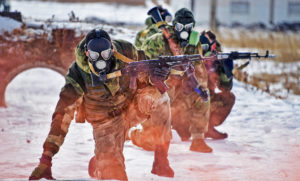Oil prices are surging. Brent crude has broken through the $100 per barrel mark — the highest level since 2014. And this could just be the start of a new oil price shock.
Russia is the world’s second biggest exporter — supplying nearly five million of the 100 million barrels of crude oil the world consumes every day. More than half of those exports flow westwards into Europe, through pipelines that cross Ukraine and Belarus. It’s difficult know which is the grimmest scenario: that the oil stops flowing due to sanctions or sabotage; or that the trade continues — filling the Kremlin’s coffers while Russian bombs rain down on Kyiv.
Markets are responding to the heightened risk in the usual manner, which could cost us dear. Oil shocks have a nasty habit of crashing economies — causing chaos far beyond the garage forecourt.
In July 2008, oil prices surged to a record high of $147 barrel. The knock-on effects were catastrophic. The ruinous cost of commuting undermined confidence in car-dependent housing developments, which crashed the sub-prime mortgage market and triggered the Global Financial Crisis. Meanwhile, the Russians took the opportunity to invade a neighbour — in this case, Georgia.
The oil shocks of the Seventies plunged the West into a decade-long retreat and the impact wasn’t just economic. A fragilised America was routed by the communists in Vietnam and traumatised by the ayatollahs in Iran. Meanwhile, the Russians took the opportunity to invade a neighbour — in this case, Afghanistan.
The Suez Crisis of 1956 was also soaked in oil. At the time, 70% of Western Europe’s oil supplies were imported via the Suez Canal. So when it was nationalised by the government of Gamal Abdul Nasser, panic ensued. Against American wishes, the British and French tried to seize back control of the vital artery. This prompted a furious President Eisenhower to punish his disobedient allies — by using the oil weapon. The Americans refused to release emergency supplies from their reserves, thus forcing the British to backdown — followed by France (and Israel). Meanwhile, the Russians took the opportunity to invade a neighbour — in this case, Hungary.
As Helen Thompson explains in her excellent new book Disorder, this was not the end of the matter: “Too often seen primarily as a story about post-war British power, the Suez crisis shattered the idea that the United States would always act as an oil supplier of last resort to its allies.” The loss of trust would have lasting consequences.
A humiliated France joined with West Germany to deepen their partnership — and lay the foundations of the European Union. Thompson quotes Konrad Adenauer’s words to the French Prime Minister: “Europe will be your revenge.” Another fateful outcome was that Western Europe did a deal with Khrushchev to gain access to Soviet oil production. Pipelines were built from East to West, re-establishing Russia as a major energy exporting power. Which brings us back to today.
The nations of the West will either hang together or hang separately. In respect to energy supplies, that means putting the trans-Atlantic relationship before domestic popularity. For instance, the Biden administration could easily pander to the American electorate by restricting exports of oil and gas. US consumers would probably benefit — but only at the cost of weakening European resolve in the face of Russian aggression. Indeed, without help from their allies, the most vulnerable countries — especially those bordering Ukraine — will be left wide open to Putin’s energy blackmail.
Europeans must make sacrifices too. In particular, the Germans need to atone for the special part they’ve played in undermining Europe’s energy security. As well as permanently scrapping the Nord Stream 2 gas pipeline, Berlin must revisit the insane decision to shutdown the country’s nuclear power stations. If it’s possible to restart the reactors, then that would send the clearest of signals that Europe will do what it takes to stand strong.
It’s important that we distinguish between short-term and long-term imperatives. In the short-term, we need to secure alternative supplies of oil and gas as a matter of urgency. If that means cosying-up to Saudi Arabia, then so be it. The same goes for Iran — negotiations to reach a new deal with the Tehran government were already underway before the Ukraine crisis and should be accelerated.
Meanwhile, back home, we shouldn’t be shy about squeezing a few more drops of oil and gas from the North Sea. It pains me to say it, but this is an issue on which my fellow greens need to shut-up. Yesterday, in what may be the worst-timed letter in history, the the Climate Change Committee wrote to the British government to oppose new North Sea production. Obviously, the Committee’s main concern is climate change, but we’re not talking about using more fossil fuels — we’re taking about reducing what we buy from Putin.
In any case, there’s a huge green prize to be won here. In the longer-term, the environmental agenda is perfectly aligned with the security agenda.
Over the last few months we’ve learned the hard way that depending on fossil fuels is a threat to our prosperity — and to our sovereignty. If we want to free ourselves from the destabilising effects of volatile energy prices and to snatch the oil weapon from the hands of our enemies, then we must free ourselves from fossil fuels altogether. That can’t be achieved overnight — hence the need for stop-gap measures — but it can be achieved within a generation.
Fundamental change is coming, the only question is how fast. So far, policy has been driven by climate change objectives, which operate on a timetable stretching into the second half of the 21st century. But the security agenda doesn’t allow us to wait that long. This isn’t about saving the planet, it’s about saving ourselves from the oil tyrants.
Disclaimer
Some of the posts we share are controversial and we do not necessarily agree with them in the whole extend. Sometimes we agree with the content or part of it but we do not agree with the narration or language. Nevertheless we find them somehow interesting, valuable and/or informative or we share them, because we strongly believe in freedom of speech, free press and journalism. We strongly encourage you to have a critical approach to all the content, do your own research and analysis to build your own opinion.
We would be glad to have your feedback.
Source: UnHerd Read the original article here: https://unherd.com



